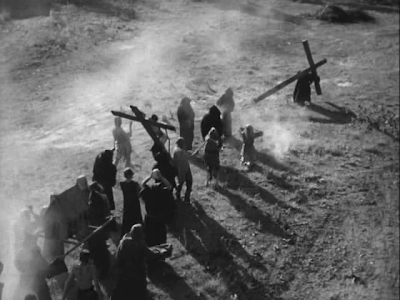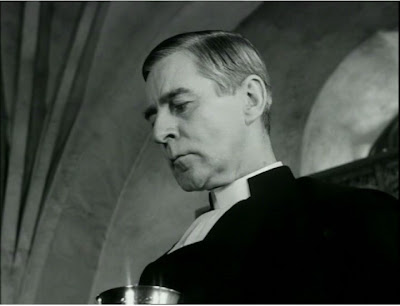Bergman's treatise on life, death, and redemption
A Potpourri of Vestiges Review |
| The Seventh Seal (1957) - Original Title: Det sjunde inseglet - By Ingmar Bergman |
Our Rating: 10.0
IMDb Ratings: 8.4
Genre: Drama | Fantasy
Cast: Max von Sydow, Gunnar Björnstrand, Bengt Ekerot
Country: Sweden
Language: Swedish | Latin
Runtime: 96 min
Color: Black and White
Summary: A Knight and his squire are home from the crusades. Black Death is sweeping their country. As they approach home, Death appears to the knight and tells him it is his time. The knight challenges Death to a chess game for his life. The Knight and Death play as the cultural turmoil envelopes the people around them as they try, in different ways, to deal with the upheaval the plague has caused.
The Seventh Seal is a 1957 motion-picture written and
directed by legendary Swedish filmmaker Ernst Ingmar Bergman. The movie
is based on a play called ‘Wood Painting’ written by Bergman himself. ‘The Seven Seals’ is a phrase in the Book of Revelation that refers to seven
symbolic seals that secure the book that John of Patmos saw in his Revelation
of Jesus Christ. Upon the opening of each seal—by the only one worthy of
opening it, who’s referred to as the “Lamb”—either a judgment is released or an
apocalyptic event occurs. The Seventh Seal begins by quoting the following excerpt
from the Book of Revelation: “And when the Lamb had opened the seventh seal there
was silence in heaven about the space half of an hour. And the seven angels who
had the seven trumpets prepared themselves to sound.” In ‘The Seventh Seal’,
Ingmar Bergman portrays this silence, momentary but alarming, as a metaphor for
the indifference of the Creator of mankind and the whole of cosmos towards His
creation.
 |
| The Seventh Seal: The Death rendezvouses The Knight |
 |
| The Seventh Seal: The Knight Antonius Bloc |
 |
| The Knight Antonius Block and The Squire Jons |
 |
| The Artist Paints the Fresco of Dance of Death |
 |
| Actors Jof and Wife Mia Perform to their Audience |
 |
| The Flagellants Imitate the Dance of Death |
 |
| Antonius Block Savors a Bowl of Fresh Milk |
 |
| The Seventh Seal: Death on the Prowl |
 |
| Swedish Maestro Ingmar Bergman |
 |
| The Seventh Seal: A Girl Being Condemned to Death |
 |
| The Knight and Squire Witness the Immolation |
 |
| Theologian Raval Succumbs to The Black Plague |
 |
| Gunnar Bjornstrand as 'The Pastor' in The Winter Light |
 |
| Bibi Anderson (Left) and Liv Ullman in Persona |
 |
| The Seventh Seal Finale: Dance of Death |
Readers, please feel free to share your opinion by leaving your comments. As always your feedback is highly appreciated!
For Best Films by Ingmar Bergman, please click here
The Seventh Seal Trailer
People who liked this also liked...


Great Post Mutrtaza !! I really enjoyed all the info in the first few paragraphs. Even I always thought of Seventh Seal as the movie that made Bergman Bergman, if you know what I mean.
ReplyDeleteI saw The Seventh Seal very recently. For some reason, I always thought it will not be very accessible like other more famous Bergman's work Persona or Cries and Whisper. But I was surprised to see how accessible it was, especially as you said for a movie that typified art cinema. One more thing that I also appreciate about it is A movie that is essentially about Death, there is so much hope in it. Scene in which they are all sitting around, drinking milk and eating wild strawberries really has made a great impact on me.
Thanks Shantanu for those kind words! I had watched it for the first time about 3 years back and being new to such kind of thought-provoking cinema I was caught in a kind of a limbo. It took me some time to come to terms with it's through might and power. I have been wanting to review it for some time, but couldn't muster the courage. Finally, I decided to watch it again... and to my surprise, I ended up having an experience of a lifetime. Thinks appear so different and so clear! I had followed a similar approach for Tarkovsky's Stalker and it had been of great help. Btw, you are absolutely right about the latent hope in Bergman's works despite the apparent pessimism that they seems to propagate.
ReplyDeleteYour post is always so rich in content-it is dense and deep and well written. I wish you were in my city and we had a movie club and you could give lectures before and after the movie. It would make the reading so much enriching! Now it is hard for me to follow without watching Seventh Seal again--I watched it long time back...:(
ReplyDeleteThanks Bhavana for those kind words! The movies made by greats like Kurosawa, Fellini, Bergman, Bunuel, Tarkovsky demand such type of deep and detailed analysis. I feel burdened when I am not able to justify their cinematic brilliance and supremacy as art. Btw, the idea of a movie club is a tempting one... maybe sometime in the near future we can actaully formulate something on those lines :-P
ReplyDelete